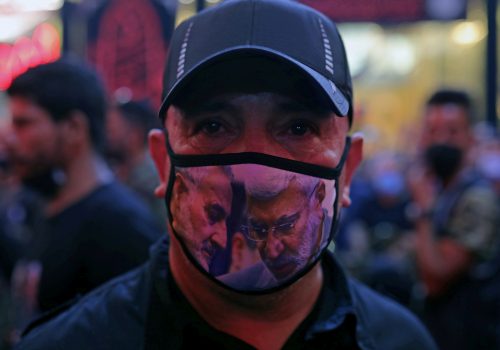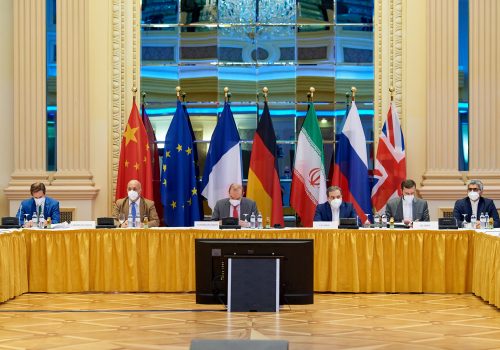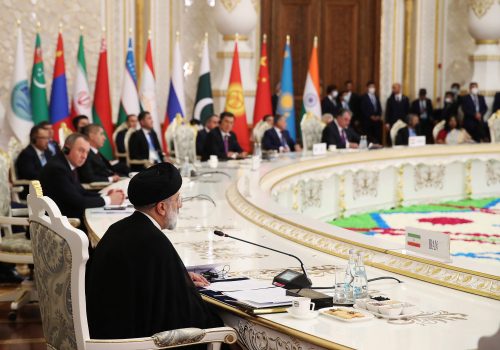Are vaccines and Afghanistan routes back to US-Iran engagement?
Efforts on the sidelines of the United Nations (UN) General Assembly last week to catalyze a swift return to talks on the Iran nuclear deal appeared to fizzle. Tehran rejected a group meeting of remaining participants to the 2015 accord and was vague about when it might resume the negotiations in Vienna that were suspended in June.
New Iranian President Ebrahim Raisi gave a harsh speech remotely from Tehran on September 21. He lampooned the United States for its domestic and international setbacks, from the January 6 riot at the US Capitol to the chaotic withdrawal of Americans and affiliated Afghans from Kabul in August. Raisi also excoriated the Joe Biden administration for continuing sanctions imposed by its predecessor, which withdrew from the Joint Comprehensive Plan of Action (JCPOA) unilaterally in 2018.
Iranian Foreign Minister Hossein Amir-Abdollahian, who led Iran’s delegation to the annual high-level diplomatic confab in New York, refused to meet with the remaining five JCPOA participants together—though he did see them one-on-one. He also refused to commit Iran to resuming talks where they left off in June, despite progress achieved in six rounds under a team appointed by Raisi’s predecessor, Hassan Rouhani. The foreign minister said Iran was still reviewing its position and would return to talks “soon” but would not specify what that meant.
In a series of comments to journalists and Americans specializing on Iran, Amir-Abdollahian suggested that the US had to do more upfront—especially to unfreeze Iranian oil revenues frozen in foreign banks so that Iran could more easily purchase vaccines for COVID-19 and other medications.
The Biden administration should have quickly unfrozen “at least a portion of Iran’s own money in foreign banks—to let Iran buy [COVID-19] vaccines,” he told a small group of US-based Iran experts, including this author, on September 24. “That would have been a good signal.”
Iran has suffered greatly from multiple waves of the coronavirus that have killed nearly 120,000 people, according to official statistics. The US contends that there are sufficient humanitarian exemptions in its sanctions to allow Iran to purchase essential goods, including medicine and medical devices. However, Iranian officials have pooh-poohed the various mechanisms established for this purpose—such as a Swiss channel and a European Union vehicle called the Instrument in Support of Trade Exchange (INSTEX)—as failures. Foreign banks remain wary of contact with blacklisted Iranian financial institutions and billions in Iranian oil revenues are stuck in overseas accounts. Iranian officials have also claimed recently that they have obtained sufficient vaccines from China and other sources as well as indigenous production.
Told about Amir-Abdollahian’s remarks, a US official who spoke on condition of anonymity noted the sanctions waivers on humanitarian relief and the US position that “we’re in favor of everyone in the world getting vaccines. If Iran has a specific idea or proposal, they should raise it with us,” the official told me.
How to get the Raisi administration to engage with the US—directly or through intermediaries—is the question.
One possible avenue could be through discussions about Afghanistan, where the US and Iran have a confluence of views. Interestingly, Iran and the United States both agreed to a proposal by UN Secretary-General Antonio Guterres for a meeting of the so-called Six Plus Two—the six neighbors of Afghanistan plus the US and Russia—on the sidelines of the UN General Assembly meeting last week. However, both Iranian and US sources confirmed to me that such a meeting—which would have put Amir-Abdollahian and US Secretary of State Tony Blinken in the same room at the same time—was nixed by Russia, China, and Pakistan.
Both Iran and the US have refused to recognize the new Taliban regime, arguing that it should be more inclusive of Afghanistan’s ethnic and religious minorities. Iran and the US worked together on Afghanistan in the past—most notably in deposing the Taliban and replacing it with a new government after the September 11, 2001 terrorist attacks. The two countries also used the Six Plus Two format for bilateral talks in the aftermath of 9/11. During the height of the coronavirus pandemic last year, they participated in a virtual Six Plus Two meeting under UN auspices.
Iran, which hosts some four million Afghan refugees, also recently allowed a group of Afghan women legislators and their families to leave Afghanistan for the US via Iran.
The Biden administration has acknowledged that the Raisi administration, which took office in August, needs time to sort out its position on the JCPOA. But US officials have also warned, without specifying a specific deadline, that at some point it will not be meaningful to restore the agreement given Iran’s rapid nuclear advances since 2019 and the “sunset” provisions in the nuclear deal that allow Iran to have unlimited quantities of enriched uranium starting in 2031. Iran has also been cooperating less and less with the International Atomic Energy Agency, which is supposed to monitor its nuclear program under the 2015 deal.
There is also the matter of four US citizens detained in Iran, including Siamak Namazi, who was kept when others were freed in 2016 as part of a prisoner swap. Iran’s prior administration had offered to trade the current detainees for Iranians jailed in the US. Their fate, too, seems to be on hold while US-Iran diplomatic contacts are suspended.
Although so-called hardliners control all branches of the Iranian government, there is still a debate within Iran over the merits of returning to the JCPOA. Some argue that Iran can afford to rely on its neighbors and trade with China, which has been purchasing a million barrels of Iranian oil a day in violation of US secondary sanctions, and that it is foolish to return to a deal that the next US administration could quit again. Others assert that Iran still needs US sanctions relief to heal its economy and benefit from membership in regional organizations, such as the Shanghai Cooperation Organization, which Iran has begun the process of achieving permanent member status in this month.
In New York, Amir-Abdollahian seemed to have a foot in both camps, noting Iran’s desire for what he called a balanced foreign policy. At the same time, he complained that “the JCPOA had great results for Iran in terms of sanctions relief only on paper.” He added, “If Mr. Biden’s administration is serious and has goodwill, Iran must feel it in a tangible way.”
Barbara Slavin is director of the Future of Iran Initiative at the Atlantic Council. Follow her on Twitter: @BarbaraSlavin1.
Image: An Iranian nurse attends to a patient suffering from coronavirus disease (COVID-19) at a hospital in Tehran, Iran September 21, 2021. Majid Asgaripour/WANA (West Asia News Agency) via REUTERS


